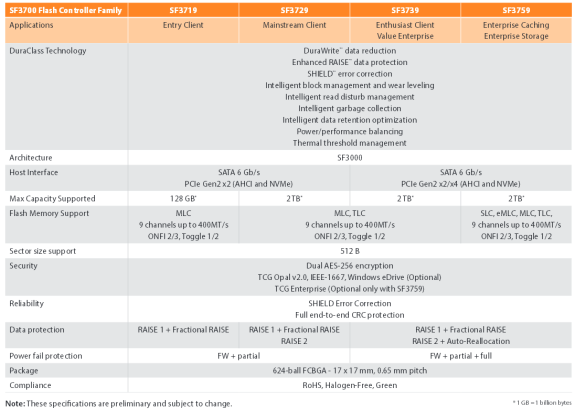The SF3719 is designed for the very bottom of the market, this controller supports both SATA and PCIe x2 and will mainly be used in M.2 form factors. The SF3729 for mainstream clients is largely the same as the SF3719 but has support for more firmware features. Another difference between these two is that the SF3719 is generally optimized for power over performance.
For computer enthusiasts and the value enterprise segment LSI SandForce will offer the SF3739, this chip exclusively supports PCIe x4 and has M.2 and 2.5" as suggested form factors. The fourth chip in the linup is the SF3759, this model uses a scalable PCIe interface and is exclusively for enterprise applications.
The reason for the move from SATA to PCIe is performance related. LSI SandForce says a 256/512GB reference based disk based on the SF3700 family peaks out at around 550MB/s read, 502MB/s write and 46k IOPS random write, whereas a PCIe 2.0 x4 model can push 1800MB/s read and write, with a 81k random write IOPS.
The first SSDs with SandForce SF3700 controllers are expected in the first half of 2014.
LSI Corporation (Nasdaq:LSI) today unveiled the third generation of its market-leading SandForce(R) flash controller line, the industry's most widely deployed flash management technology for driving PCIe(R) and SATA solid state drive (SSD) and flash card solutions. Designed to support power-sensitive client computing applications as well as I/O-intensive enterprise and hyperscale environments, the new LSI(R) SandForce SF3700 flash controller family provides the increased levels of flash performance, reliability and endurance needed to meet the exacting needs of SSD manufacturers.
The SF3700 family is the industry's first flash controller that provides the flexibility to support both native PCIe Gen2 x4 and SATA 6Gb/s host interfaces in a single ASIC design. This unique capability greatly simplifies SSD designs and helps to significantly reduce development and manufacturing costs for SSD makers.
With the addition of the SF3700 family's PCIe interface support, users can achieve breakthrough client performance of over 1.8GB/s sequential reads, a 3x improvement compared to SATA-based solutions.
"From our everyday lives to the hyperscale datacenter, flash storage solutions are transforming the speed and efficiency of data storage," said Huibert Verhoeven, vice president and general manager, Flash Components Division, LSI. "The SF3700 family brings a new architecture, designed from the ground up to deliver unmatched flash performance and the longevity required to drive current and future portable client computing, enterprise and big data applications."
"Intel is focused on providing unique offerings optimized for our customers' specific needs," said Rob Crooke, Intel corporate vice president and general manager for the Intel Non-Volatile Memory Solutions Group. "Intel expects accelerated and broader industry adoption of PCIe clients, including those with the new LSI SF3700 PCIe controller family, helping to ensure our customers have the right solution for every application."
Unique and industry-first LSI SandForce SF3700 features and benefits:
Native PCIe and SATA Interfaces: M.2 form factor cards designed with the SF3700 flash controller's industry-only dual PCIe and SATA interface can use a simple manufacturing jumper to select the final desired interface for better inventory and cost management. The SF3700 family's PCIe interface supports AHCI and NVMe protocols to enable both legacy applications of PCIe flash and efficient NVMe flash storage application acceleration solutions.
Optimized DuraWrite(TM) Data Reduction: Exclusive SandForce controller data reduction technology combines several techniques to extend NAND flash memory life as flash geometries shrink and trend toward lower reliability. The SF3700 family's optimized DuraWrite data reduction technology helps to maximize SSD endurance by further lowering write amplification and the number of program erase (P/E) cycles.
SHIELD(TM) Error Correction: This technology extends flash memory life and significantly improves data integrity by implementing a flash-optimized low-density parity-check (LDPC) code that combines hard-decision, soft-decision and digital signal processing (DSP) together with unique adaptive error correction code rates. This enables SSD manufacturers to deliver enterprise-class product life and data integrity, even when using less expensive flash memory.
Enhanced RAISE(TM) Technology: Redundant Array of Independent Silicon Elements (RAISE) technology, which is similar to RAID, delivers new levels of data protection specifically designed for SSDs by protecting against page, block and full die failures in a single drive environment. The SF3700 family's unique ninth channel for an extra flash package enables more RAISE protection and user capacity options.
Dual AES-256 Encryption: Data security is an important component in today's digital age, and the SF3700 family enterprise controllers feature unique dual AES-256 drive-level encryption to secure data without incurring additional host processor load. Optional support for TCG Opal and Enterprise specifications ensure broad interoperability and ease of data security management.
SF3700 family controllers provide up to 2TB maximum capacity and a 9-channel ONFI-3/Toggle-2 flash interface. Their modular and flexible architecture enables fast migration to new host interfaces and media types, allowing for significant firmware reuse between new products, as well as continuous innovation throughout the life of the product. The result is an accelerated time to market, increased ability to support customer-specific customizations, and an extended product life for SSD manufacturers and system OEMs.
LSI is demonstrating the new SF3700 family controllers this week at the SC13 conference in Denver, Colo., and at LSI's Accelerating Innovation Summit (AIS) taking place in San Jose, Calif.
The AIS demo will showcase the SF3700 family's breakthrough client performance of 1.8GB/s sequential reads using Toshiba's second generation Advanced 19 nanometer (A19nm) NAND flash memory. LSI will also display initial reference designs, which support flash memory vendors Micron, SanDisk and Toshiba. In addition, SandForce flash controller customers ADATA, Avant and Kingston will showcase SF3700-based PCIe and SATA SSD products.
SF3700 flash controllers are currently sampling to select SSD OEM customers. Volume customer shipments are expected in the first half of 2014.
